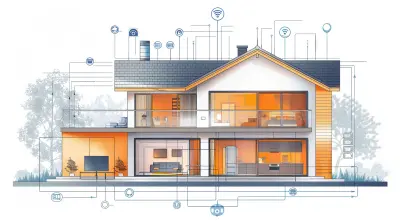Fitness Trackers and Nutrition: Integrating Tech into Your Meal Plans
23 June 2025
Technology has completely changed how we approach fitness and nutrition. Gone are the days of manually tracking every calorie or guessing whether you've hit your macros for the day. Enter fitness trackers—your personal health assistants that not only monitor your physical activity but also help you stay on top of your nutrition game.
But how well do these gadgets actually integrate with your meal plans? Can they truly help you eat better, or are they just another tech gimmick? Let’s dive in and find out how fitness trackers can revolutionize how you plan, track, and optimize your nutrition. ![]()
How Fitness Trackers Have Evolved Beyond Counting Steps
When fitness trackers first hit the scene, they were basically glorified pedometers. They counted steps and, if you were lucky, estimated your calorie burn. That was about it.Fast forward to today, and these devices are smarter than ever. They monitor heart rate, sleep quality, and stress levels, and even connect with apps that track your food intake. With AI-driven algorithms and real-time data syncing, fitness trackers are no longer just about movement—they're about your entire well-being, including nutrition.
So how exactly do they fit into meal planning? Let’s break it down. ![]()
How Fitness Trackers Can Help with Nutrition
1. Automated Calorie Tracking
Most modern fitness trackers sync with food-tracking apps like MyFitnessPal, Lose It!, or Fitbit's built-in nutrition tracker. This means instead of manually logging everything you eat, you can scan barcodes, input meal data, and even get personalized recommendations based on your activity level.And let’s be honest—who has time to calculate every calorie manually? These integrations take the guesswork out of the process and help you stay within your goals effortlessly.
2. Personalized Nutrition Insights
Ever wonder why some diets work for others but not for you? That’s because your body has unique nutritional needs based on your metabolism, activity level, and overall health.Fitness trackers provide real-time feedback on how many calories you burn throughout the day. Some advanced models even analyze your heart rate variability (HRV) to determine stress levels, which can impact digestion and nutrient absorption.
When synced with a food tracking app, your device can suggest better food choices based on your activity level and dietary preferences. For example, if you’ve had an intense workout, your tracker might recommend more protein-rich foods to help with muscle recovery.
3. Tracking Macronutrient Balance
Calories are important, but the quality of those calories matters even more. Are you getting enough protein? Too many carbs? Not enough healthy fats? Instead of blindly following a generic diet plan, your fitness tracker can align your meal plan with your personal health goals.Some higher-end devices even offer glucose tracking, hydration reminders, or vitamin intake suggestions—helping you build a well-rounded nutritional strategy tailored to your needs.
4. Meal Timing and Circadian Rhythm Syncing
Did you know that when you eat can be just as important as what you eat? Fitness trackers can monitor sleep quality and stress levels, helping you identify the best times to eat for digestion and energy levels.For instance, if your tracker notices poor sleep patterns, it might suggest adjusting your dinner timing to improve your metabolism. Some apps even integrate intermittent fasting schedules, syncing your nutritional intake with your body's natural rhythms. ![]()
Best Fitness Trackers and Apps for Nutrition Management
If you're serious about integrating technology into your meal planning, choosing the right fitness tracker and app combo is crucial. Here are some of the best options out there:1. Fitbit Charge 5 + MyFitnessPal
- Fitbit monitors calories burned, heart rate, and stress levels- MyFitnessPal allows detailed food logging and barcode scanning
2. Apple Watch + Lifesum
- Apple Watch provides real-time activity data and heart rate tracking- Lifesum offers personalized diet plans, macro tracking, and meal suggestions
3. Garmin Venu 2 + Cronometer
- Garmin provides advanced health metrics like oxygen levels and body battery insights- Cronometer tracks micronutrients and custom biometrics
4. Whoop + Noom
- Whoop focuses on recovery, strain, and sleep analysis- Noom combines psychology-based nutritional guidance with calorie tracking
Each of these combinations brings something unique, whether it's precise calorie tracking, in-depth nutritional breakdowns, or AI-driven meal recommendations. ![]()
Challenges of Using Fitness Trackers for Nutrition
While fitness trackers offer a lot of benefits, they aren’t perfect. Here are some of the most common challenges you might face:1. Accuracy Issues
No matter how advanced, fitness trackers and food logging apps aren’t always 100% accurate. Calories burned and food intake estimates can fluctuate, so always use them as a guideline rather than absolute truth.2. Manual Logging Can Be Tedious
Even though apps make it easier, logging every meal can still be annoying. If you cook most of your meals, entering exact ingredients can feel like extra homework. However, using pre-set meal templates can help speed up the process.3. Over-Reliance on Data
Numbers are great, but they don’t tell the whole story. Fixating on calorie counts or step goals can sometimes lead to an unhealthy obsession with food and exercise. Always prioritize overall well-being rather than just numbers on a screen.4. Cost Factor
Not all fitness trackers are cheap, and premium nutrition tracking apps often require a paid subscription. If you’re on a budget, look for free integrations or consider a balance between affordability and features.Tips for Successfully Integrating Fitness Trackers into Meal Planning
To get the most out of your fitness tracker in terms of nutrition, keep these tips in mind:✅ Sync Your Devices – If possible, connect your fitness tracker with a food-tracking app for seamless data analysis.
✅ Use Pre-Saved Meals – Save frequently eaten meals in your tracking app to reduce manual input.
✅ Prioritize Whole Foods Over Macros – Don’t just focus on numbers—choose nutrient-dense foods for long-term health.
✅ Listen to Your Body – Your tracker provides data, but it’s not a substitute for body awareness. Eat when you're hungry, not just because an app tells you to.
✅ Set Realistic Goals – Avoid drastic calorie restrictions. Sustainable nutrition is about balance, not deprivation.
Final Thoughts: The Future of Fitness and Nutrition Tech
Fitness trackers have come a long way, and their ability to integrate with meal planning is genuinely impressive. By providing real-time data, personalized meal suggestions, and automated tracking, they make it easier than ever to stay on top of your nutritional goals.However, they should be used as tools, not crutches. The best approach is to combine the insights from your fitness tracker with mindful eating habits and a well-rounded diet.
As technology evolves, we can expect even more advanced nutrition-tracking features—maybe even AI-driven meal suggestions based on your gut microbiome. But for now, if you're looking to upgrade your meal planning game, a fitness tracker might just be the game-changer you need.
all images in this post were generated using AI tools
Category:
Fitness TrackersAuthor:

Gabriel Sullivan
Discussion
rate this article
2 comments
Tempest Coleman
Sure, tech can track your steps and calories, but let’s be real: nothing replaces good old-fashioned portion control and common sense. If your meal plan needs a gadget to succeed, maybe it's time for a personal chef instead. Just saying!
June 23, 2025 at 10:48 AM

Gabriel Sullivan
Absolutely, while tech can enhance our efforts, basic principles like portion control and mindful eating remain essential for a balanced approach to nutrition.
Isabella McClellan
Sure, fitness trackers and meal plans sound great, but let’s be real: if my salad doesn’t come with a side of fries, I’m not interested. Tech can’t replace my love for food—let’s just hope it keeps my guilt in check while I indulge!
June 23, 2025 at 4:51 AM

Gabriel Sullivan
I totally get that! Balancing enjoyment and wellness is key—tech can help you track without sacrificing your love for food. It's all about finding that sweet spot!

